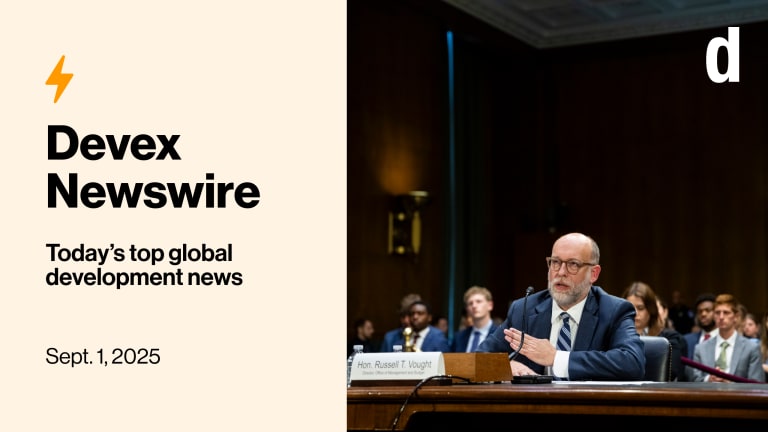
The United Nations probes corruption in Yemen operations, U.K. lawmakers tell DFID to tackle aid worker security, and Georgieva nabs the IMF nomination. This week in development:
The White House Office of Management and Budget has frozen more than a dozen U.S. foreign aid accounts in what appears to be the start of an effort to retract billions of dollars in development assistance funds already appropriated by Congress. The accounts, which include money for contributions to international organizations, international peacekeeping, development assistance, economic support, global health, and other areas, are believed to contain between $2 billion and $4 billion. Michael Duffey, an associate director in the White House budget office, directed the U.S. Agency for International Development and the State Department to report back on the amount of unobligated funding remaining in the listed accounts that will expire on Sept. 30. Many in the U.S. development community expect the White House will soon initiate a process known as “rescission,” which would seek congressional approval to take back these unspent development funds. The situation is complicated by the fact that the rescission process would begin close to the end of the fiscal year, leaving Congress with limited time and unclear options to prevent the retraction of funding. The Trump administration considered a similar move last summer, but ultimately abandoned that plan after USAID missions managed to spend down their remaining funds quickly. Development experts told Devex they expect the Trump administration will not back down from the plan this year, despite a Government Accountability Office finding in December that a strategically timed rescission represents an abuse of the White House’s limited budget authority.
The World Health Organization is investigating allegations of corruption within its Yemen humanitarian response operations. On Monday, the Associated Press reported that in October 2018 a team of U.N. investigators in Yemen’s capital city of Sanaa were confronted by armed members of the Houthi militia, who seized the laptops and external hard drives that reportedly contained evidence of fraud, nepotism, and corruption before the U.N. team could depart. According to the AP, the allegations include financial mismanagement by Nevio Zagaria — the head of WHO’s Sanaa office from 2016 to September 2018. People with direct knowledge of the case described “incompetent staff with heavy salaries” and “many loopholes for corruption,” and even told the AP that Zagaria hired two junior staffers for senior positions, only to assign them to care for his dog. The probe is also reportedly examining potential conflicts of interest, including by an official in WHO’s Aden branch, who could not account for money deposited to his personal account, and whose own private nonprofit organization had a $1.3 million contract with UNICEF, despite not having any actual presence on the ground in the city where it claimed to be operating.
U.K. lawmakers want the Department for International Development to take the lead on improving aid worker security, according to a report published Tuesday by the parliament’s International Development Committee. The report found that 2018 was the second worst year on record for attacks against aid workers. In response IDC’s chair Stephen Twigg called on DFID to help build “international consensus on how better to enforce humanitarian law” and to investigate “how diplomatic pressure can be applied against states who hold it in such disregard.” While humanitarian groups have welcomed that message, they also reiterated that the U.K. government has its own responsibility to avoid politicizing aid, which can be a factor in placing aid workers in danger. Some warned that new Prime Minister Boris Johnson’s apparent interest in merging DFID with the country’s foreign office could even exacerbate this trend.
The European Union has nominated Kristalina Georgieva, a Bulgarian economist and World Bank chief executive, to be the next managing director of the International Monetary Fund. In a contested vote — as opposed to a clear consensus — Georgieva narrowly defeated Jeroen Dijsselbloem, a former Dutch finance minister. Britain abstained from voting, citing a flawed process. While the position has historically gone to a European, other countries have until Sept. 6 to nominate other candidates.








